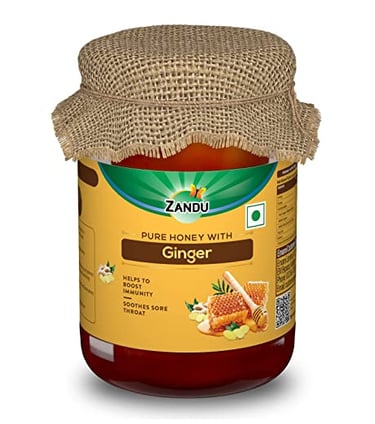GINGER GREAT HEALER
Turmeric, cardamom, and galangal are all linked to ginger. Ginger, like other plants, is a complex collection of molecules with hundreds of recognised ingredients such as beta-carotene, capsaicin, caffeic acid, and curcumin.
Ginger's pungency is produced from the primary chemicals gingerol, shogaol, and zingerone.
Gingerol, the active ingredient in fresh ginger, is connected to capsaicin, the main ingredient in chilli peppers. When gingerol is boiled, it produces gingerone, the least pungent chemical, whereas dried gingerol produces shogaol, which is twice as pungent.
1 Immune booster: helps prevent coughs and colds
Ginger is an excellent immune system stimulant, making it a popular therapy for colds and flus. Because it relieves the symptoms of an upper respiratory tract infection, it is also effective for coughs, sore throats, and bronchitis.
Ginger helps to clear the body's microcirculatory channels, particularly the bothersome sinuses that flare up during colds. Drinking ginger with lemon and honey is a traditional cold and flu cure that has been passed down through centuries in both the east and the west.
Ginger also contains thermogenic qualities, which means it may both warm up the body and, more importantly, encourage healthy sweating.
2 Effective Anti-Inflammatory: Reduces and relieves joint pain Arthritis
Ginger has a powerful anti-inflammatory chemical called gingerol, which is responsible for relieving joint and muscular discomfort. Ginger impacts various inflammatory processes at the cellular level, according to a study published in the Journal of Medicinal Food. Its pharmacological effects are similar to those of nonsteroidal anti-inflammatory medications, making it a useful treatment for both acute and chronic inflammatory disorders.
Many more scientific research back up ginger's pro-analgesic action on joints, particularly in the early stages of rheumatoid arthritis. Many patients with osteoarthritis have experienced less pain and greater mobility after regularly taking ginger.
According to Hong Kong research, massage therapy using ginger and orange oil appears to alleviate short-term stiffness and pain in individuals with knee problems.
Exercise-induced inflammation and muscular soreness can also be reduced with ginger. In a study conducted by the University of Georgia, researchers gave raw and heat-treated ginger to two groups of 34 and 40 participants for 11 days.
3 Treats Respiratory Disorders: Effective in the Treatment of Asthma
Ginger chemicals have shown good results in the treatment of respiratory problems, and research indicates that it is a promising treatment for asthma sufferers. Asthma is a chronic disease that happens when the muscles in the oxygen pathways of the lungs become inflamed and sensitive to various substances that cause spasms.
Ginger works in part because of its powerful antioxidant, anti-inflammatory, and analgesic components, which have qualities similar to nonsteroidal anti-inflammatory medications but without the bad side effects. While asthma can be fatal, several of the drugs used to treat it can have serious side effects. Finding alternative, safe therapies, such as ginger, is thus a potential discovery in the treatment of this disease.
4 Pain Relief: Relieves migraines and menstrual cramps
Ginger has been demonstrated in studies to provide pain relief from migraine headaches. A study conducted in Iran and published in the journal Phytotherapy Research discovered that ginger powder is just as effective as sumatriptan, a typical migraine medicine, in alleviating migraine symptoms.
In the clinical experiment, 100 migraine patients with acute symptoms were assigned at random to either sumatriptan or ginger powder. The researchers discovered that the efficacy of delivering both was comparable, however the bad effects of ginger powder were less severe than sumatriptan, making it a safer migraine treatment.
Ginger relieves migraines by inhibiting prostaglandins, which promote muscular contractions, govern inflammation in blood vessels, and influence certain hormones. Drinking ginger tea during the start of a migraine episode suppresses prostaglandins, which inhibit the terrible pain and prevent nausea and dizziness.
Ginger can also assist women effectively relieve the pain of dysmenorrhea. (painful menstruation). In an Iranian study, 70 female students were separated into two groups. For the first three days of their menstrual cycles, one group was given ginger capsules and the other a placebo. The researchers discovered that 82.85% of the women who took ginger capsules reported improvements in pain symptoms, compared to 47.05% of those who took a placebo.
Many cultures also apply fresh ginger juice to burns, and topical application of ginger oil has been shown to be particularly effective in the treatment of joint and back pain.
5 Most Popular Digestive Aid: Relieves Stomach Problems
Ginger has been utilised as a digestive aid by ancient societies for thousands of years. Its carminative characteristics help to eliminate intestinal gas, preventing bloating and flatulence, while its intestinal spasmolytic properties relax the gastrointestinal muscles, calming an upset stomach.
Eating slices of ginger dusted with salt before meals can help digestion and reduce stomach upset. Drinking ginger tea after a large meal might also help minimise bloating and flatulence. If your stomach troubles are more serious, ginger can assist relieve the numerous symptoms of food poisoning.
6 Anti-tumor Properties: Effective in the Killing of Cancer Cells
Modern research has recently focused on ginger as a potential treatment for several forms of cancer, with promising findings.
According to one study from the University of Michigan Comprehensive Cancer Center, ginger not only killed ovarian cancer cells, but it also prevented them from developing resistance to chemotherapy, which is a major problem in ovarian cancer patients.
Researchers treated ovarian cancer cells with a solution of ginger powder and water in the study. They discovered that when the cancer cells came into touch with the ginger solution, they died. Each of the cells either committed suicide, a process known as apoptosis, or attacked one another, a process known as autophagy.
Ginger has also been shown to be useful in the treatment of breast, prostate, and colon cancer.
It is highly desirable to utilise natural medicines such as ginger, which are harmless and can inhibit the growth of breast cancer cells. Ginger also has the advantage of being easy to administer in capsule form, having minimal known adverse effects, and being a low-cost alternative to conventional medications.
According to current scientific research, ginger can also reduce inflammation in the colon, potentially preventing colon cancer. A group of 30 patients was given two grammes of ginger root supplements or a placebo for 28 days in a study conducted by the University of Michigan. Researchers discovered substantial reductions in colon inflammation indicators in patients given ginger root after 28 days, making it an excellent natural preventative technique for those at risk of colon cancer.
Ginger chemicals have also been researched for their ability to prevent different types of cancer, including as rectal cancer, liver cancer, lung cancer, melanoma, and pancreatic cancer. It's also worth noting that ginger is the source of beta-elemene, an anti-cancer medication.
7 Effective Antioxidant: Reduces DNA Damage
Many studies throughout the world have discovered that ginger has powerful antioxidant effects that help protect lipids from peroxidation (rancidity) and DNA damage.
Antioxidants are incredibly important because they defend against free radicals, which helps lessen the many forms of degenerative diseases associated with aging, such as cancer, heart disease, diabetes, arthritis, Alzheimer's disease, and others.
While all spices are known to be high in antioxidants, ginger appears to be especially effective. On its own, it has 25 distinct antioxidant characteristics. This makes it efficient against a wide range of free radicals and in diverse parts of the body.
8 Diabetes Compounds: Reduces Blood Sugar and Increases Insulin Release
In the case of diabetes, research have demonstrated that ginger is both preventative and therapeutic.
Ginger was discovered to be useful in glycemic management for persons with type 2 diabetes by researchers at the University of Sydney in Australia. The study, published in the journal Planta Medica, found that ginger extracts can boost glucose uptake into muscle cells without the use of insulin, which may help with the control of high blood sugar levels.
Another research trial found that diabetic individuals who consumed three grammes of dry ginger every day for 30 days had a substantial drop in blood glucose, triglyceride, total and LDL cholesterol levels.
Ginger treats diabetes by enhancing insulin release and sensitivity, blocking glucose metabolism enzymes, and improving lipid profiles. Ginger also has a low glycemic index (GI), which means it breaks down slowly to generate glucose and does not cause a surge in blood sugar levels like high GI meals.
Several other trials have found ginger to be effective in preventing diabetes complications. Ginger can help diabetics maintain their liver, kidneys, and central nervous system, as well as lower their chance of cataracts, which are a typical side effect of the disease.
9 Heals the Heart: Treats a Wide Range of Cardiovascular Disorders
Ginger has long been used to treat heart issues due to its high potassium, manganese, chromium, magnesium, and zinc content, as well as its anti-inflammatory effects.
Ginger's therapeutic powers were supposed to strengthen the heart in Chinese medicine, and ginger oil was frequently used to prevent and treat heart disease.
Modern research indicates that the herb's constituents lessen the incidence of heart attacks and strokes by decreasing cholesterol, regulating blood pressure, boosting blood flow, and preventing clogged arteries and blood clots.
10 Nausea Treatment: Reduces Motion Sickness and More
Ginger is extremely effective for relieving nausea and vomiting, including morning sickness in pregnant women, motion sickness in travelers, and nausea in chemotherapy patients.
Despite being administered anti-emetics throughout treatment, 70% of chemotherapy patients report experiencing nausea. A recent study on adult cancer patients discovered that taking 0.5 to 1 gramme of ginger daily before chemo dramatically reduced the severity of acute nausea in 91% of the subjects.
The plant also aids in the relief of dizziness and nausea caused by vertigo. According to research, the medicinal compounds in the spice work in the brain and neurological system to control the effects of nausea.
www.lifethicss.com




